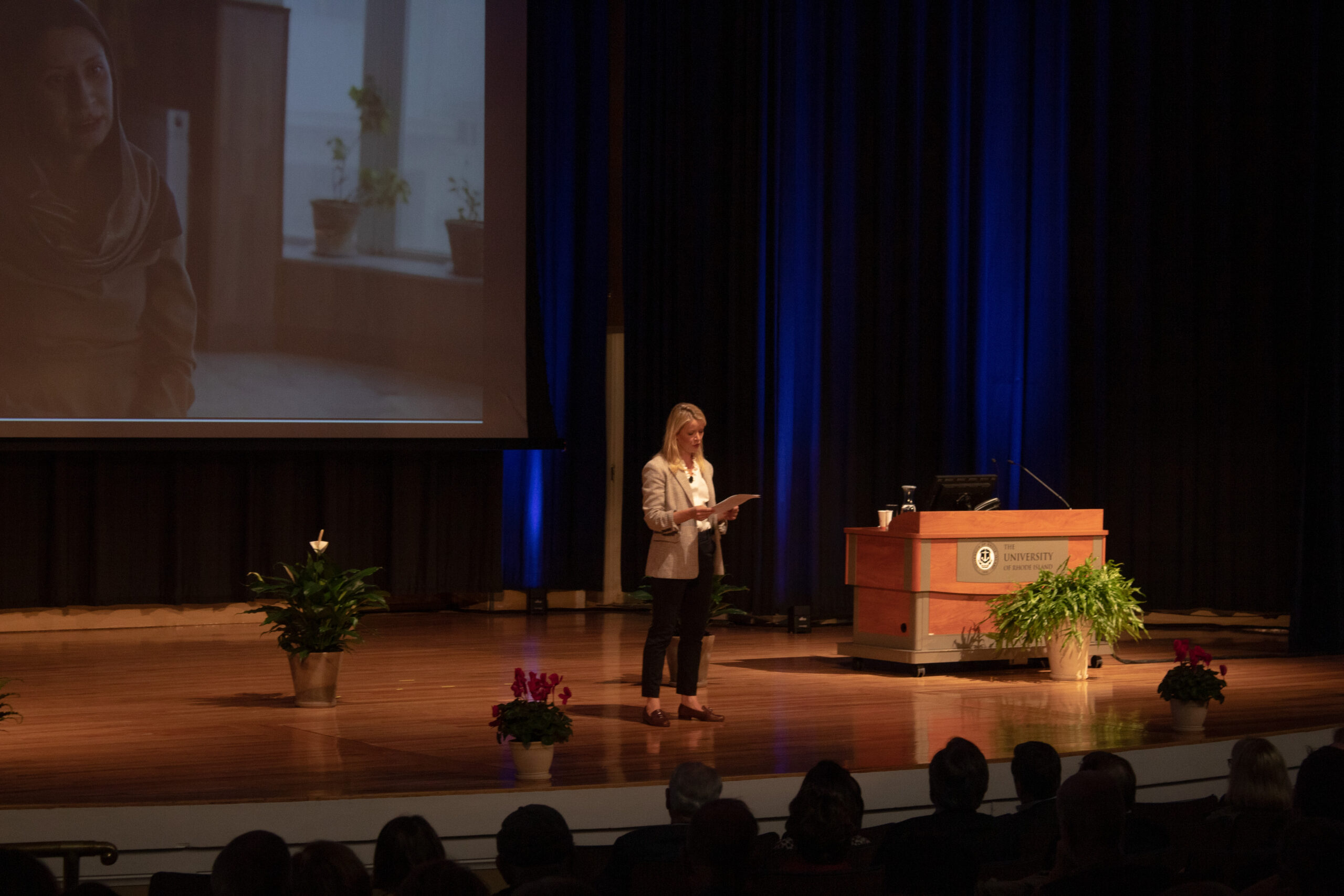Fifteenth annual Christiane Amanpour lecture held in-person again
PHOTO CREDIT: Hannah Charron | Staff Photographer
The Harrington School of Communication and Media held its 15th annual Amanpour Lecture on Oct. 20 entitled “Humanity in War Reporting: Bringing Authentic Individual Experiences of War Into Conflict Journalism,” featuring award winning journalist Jane Ferguson.
The lecture series, named after CNN Chief International Anchor and University of Rhode Island alum Christiane Amanpour, invites renowned journalists to speak on campus.
Ferguson serves as an international correspondent for PBS NewsHour and a contributor to the New Yorker. She has extensively covered Afghanistan, and was present for the fall of Kabul from the Afghan government to the Taliban and other local armed groups in August of 2021. She has also reported from other countries during periods of war, including Yemen, Syria and most recently Ukraine. The evening lecture saw about 200 people in attendance, both virtually and in-person, many of whom were URI’s journalism students.
Her lecture, titled “Humanity in War Reporting: Bringing Authentic Individual Experiences of War Into Conflict Journalism,” explores ways of humanizing the victims of humanitarian crises and war through journalistic writing.
“The meaning of life is to serve humanity,” Ferguson quoted from nineteenth-century Russian writer Leo Tolstoy.
Ferguson said her style of reporting puts special emphasis on telling a story through the eyes of war victims and examining in-depth the consequences of war on people. Ferguson said that individual stories are very valuable in pursuit of this.
“As journalism students, I just can’t emphasize enough that’s really where you start when you’re covering a war, when you’re really trying to communicate to your audience how war is actually impacting human beings,” Ferguson said. “It’s very important for us to understand that we’re not looking for an interview. I’m not looking for a soundbyte, we’re looking for characters.”
The audience also had the chance to hear about Ferguson’s early career. Ferguson recalled one of her earliest experiences with reporting in Afghanistan, which saw her boarding a flight there at age 25. Clips of her reporting with PBS NewsHour were also shown during the lecture, which gave students some insight into Ferguson’s journalistic process.
Later that evening, Ferguson held a question and answer session, moderated by URI alum Vladimir Duthiers of CBS News. During the discussion, Jane spoke on her experiences with handling the emotions that inevitably rise as a result of her high-stress, intensive work.
“You have to take care of yourself,” Ferguson said. “Added into the subliminal trauma that we’re all experiencing while working is the fact that we’re also physically and emotionally exhausted.”
Duthiers added to the conversation by relating his own similar experiences reporting the 2010 Haiti earthquake with CNN.
“Christiane [Amanpour] would always say ‘this story is not you, it’s not us. It’s the person you’re profiling,’ but after we saw these mass graves, I got into the car and started crying,” Duthiers said. “Anderson [Cooper] came over to me and said ‘it’s okay here, in this space, because it shows that you’re human.’”
Additionally, Ferguson stressed the importance of caring about your work, noting that her job can only be sustained if she actually cares about it.
By the end of the lecture, Ferguson had a few words for the students of URI. She explains that aspiring journalists don’t necessarily have to follow the same path.
“[There] are still tons of stories that don’t have to be told in the ‘hot zones’ of the world. You don’t have to be chasing the ‘bang-bang,’” Ferguson said.

